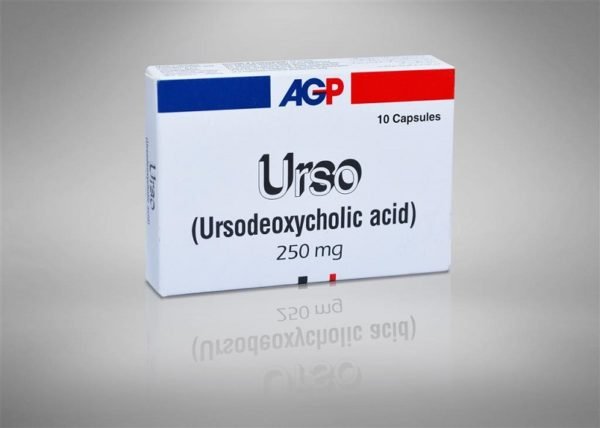Ursodeoxycholic acid (UDCA) is a naturally occurring bile acid found in small quantities in human bile. It is produced in the liver and is commonly used as a medication to treat certain liver diseases. UDCA has been shown to reduce the levels of cholesterol in bile and to dissolve gallstones in certain cases. It's also used to treat primary biliary cholangitis (PBC), a chronic autoimmune liver disease. Additionally, UDCA has been studied for its potential benefits in other conditions, such as non-alcoholic fatty liver disease (NAFLD) and cholestasis of pregnancy.
Urso (Ursodiol, Ursodeoxycholic acid) reduces the amount of cholesterol found in bile and bile stones by reducing the amounts of cholesterol secreted by the liver and partially absorbed by the intestines.
It is used in the treatment of the following conditions:
- Gallstones (capsules only):
- When an elective cholecystectomy would be performed on a patient with radiolucent, noncalcified gallbladder stones fewere than 20 mm in diameter, it would be used to treat them unless doing so would increase their surgical risk because of a rare reaction to general anesthesia, a systemic disease, advanced age, or a patient's decision to forego surgery.
- In obese patients who are losing weight quickly, it is used to prevent the development of gallstones.
- Primary biliary cirrhosis (tablets only):
- It is used to treat people who have PBC, or primary biliary cirrhosis.
- Off Label Use of Adults:
- It prevents gallstones after bariatric surgery.
The other medicine used in the treatment and prevention of gallstones ischenodeoxycholic acid (Chenodiol).
Urso (Ursodeoxycholic Acid) Dose in adult
Ursodeoxycholic AcidFor the treatment of gallstones, urso (Actigall) dosage:
- The typical dose is 8 to 10 milligrams per kilogram of body weight per day.
- You take it by mouth, usually split into 2 or 3 doses throughout the day.
- It's important to note that using this medication for more than 24 months hasn't been fully studied or established yet.
Using Ursodeoxycholic Acid off-label to treat and prevent gallstones after bariatric surgery:
- The typical dose is 500 to 600 milligrams taken by mouth once a day or split into two doses for six months.
- It's worth noting that doses up to 1,200 milligrams per day were effective, but they were linked with more instances of nonadherence according to a study by Magouliotis in 2017.
Using Actigall's urso dose to prevent gallstones:
- The typical dose is 300 milligrams taken orally twice a day.
Urso dosage (Urso, Urso Forte) for the management of primary biliary cirrhosis:
- The usual dose is 13 to 15 milligrams per kilogram of body weight per day.
- This is typically divided into 2 to 4 doses taken orally with food.
- However, to make it easier for patients to stick to the regimen, it can be given once a day, usually at bedtime.
Urso (Ursodeoxycholic Acid) Dose in Children
Ursodeoxycholic AcidDose for the management of biliary atresia in the status following Kasai surgery:
- For infants and children is 10 to 20 milligrams per kilogram of body weight per day. This is typically divided into 2 to 3 doses throughout the day. The dosing information is based on limited data from small prospective and retrospective trials, where ursodiol was used as part of a combination therapy aimed at reducing the risk of cholangitis.
Ursodeoxycholic Acid dose in the Treatment of cholestasis-related pruritus with urso dose
In infants, children, and adolescents:
- The recommended dose of Ursodeoxycholic Acid (ursodiol) is 15 to 20 milligrams per kilogram of body weight per day.
- This can be taken orally once daily or divided into two doses taken twice daily.
- In some cases, doses up to 30 milligrams per kilogram per day may be necessary.
- The dosing information is based on studies including a long-term trial involving 13 patients aged 2 to 27 years, where six of them experienced symptomatic improvement in pruritus. Another study involving 24 pediatric patients aged 1.5 to 15 years found that all patients experienced improvement in pruritus, with 16.7% achieving complete resolution.
Ursodeoxycholic Aciddose for the treatment of liver disease associated with cystic fibrosis:
In infants, children, and adolescents:
- The recommended initial dose of Ursodeoxycholic Acid (ursodiol) is 20 milligrams per kilogram of body weight per day.
- This is typically divided into two doses taken orally.
- However, there's a reported range of 10 to 30 milligrams per kilogram per day in divided doses.
- It's important to individualize the dose based on the patient's response.
Ursodeoxycholic Acid dose in theTreatment of cholestasis brought on by parenteral nutrition with Urso:
In infants and children:
- The recommended dose of Ursodeoxycholic Acid (ursodiol) is 30 milligrams per kilogram of body weight per day.
- This dose is typically divided into three doses taken orally throughout the day.
Urso Pregnancy Risk Factor: B
- It's reassuring to note that adverse events haven't been observed in animal reproduction studies regarding Ursodiol (ursodeoxycholic acid).
- This supports its use as the treatment of choice for intrahepatic cholestasis of pregnancy, as highlighted by Kremer in 2011.
- This indicates that Ursodiol could be a safe and effective option for managing this condition during pregnancy.
Urso (Ursodiol) use during breastfeeding:
- Since it's not known whether Ursodiol (ursodeoxycholic acid) is excreted in breast milk, caution is advised when considering its use in breastfeeding women.
- The manufacturer recommends exercising caution when administering Ursodiol to breastfeeding women due to this uncertainty.
- This caution is intended to ensure the safety of both the mother and the infant.
Urso (Ursodeoxycholic Acid) Dose in Renal Disease:
- According to the manufacturer's labeling, there are no dosage adjustments recommended for Ursodiol (ursodeoxycholic acid) in cases of renal impairment.
Urso (Ursodeoxycholic Acid) Dose in Liver Disease:
- According to the manufacturer's labeling, there are no dosage adjustments recommended for Ursodiol (ursodeoxycholic acid) in cases of hepatic impairment.
Common Side Effects of Urso (Ursodeoxycholic Acid) Include:
- Respiratory:
- Upper Respiratory Tract Infection
- Central Nervous System:
- Headache
- Dizziness
- Neuromuscular & Skeletal:
- Back Pain
- Gastrointestinal:
- Dyspepsia
- Nausea
- Diarrhea
- Constipation
Less Common Side Effects of Urso (Ursodeoxycholic Acid) Include:
- Gastrointestinal:
- Vomiting
- Peptic Ulcer
- Genitourinary:
- Urinary Tract Infection
- Dermatologic:
- Alopecia
- Skin Rash
- Hepatic:
- Cholecystitis
- Hypersensitivity:
- Hypersensitivity Reaction
- Endocrine & Metabolic:
- Hyperglycemia
- Hematologic & Oncologic:
- Leukopenia
- Thrombocytopenia
- Infection:
- Viral Infection
- Renal:
- Increased Serum Creatinine
- Neuromuscular & Skeletal:
- Arthritis
- Musculoskeletal Pain
- Respiratory:
- Pharyngitis
- Bronchitis
- Cough
- Flu-Like Symptoms
Contraindications to Urso (Ursodeoxycholic Acid) include:
- Ursodiol (ursodeoxycholic acid) is contraindicated in individuals with hypersensitivity to ursodiol or any component of the formulation. Additionally, it should not be used in patients with calcified cholesterol stones, radiopaque stones, or radiolucent bile pigment stones.
- Furthermore, Ursodiol is contraindicated in individuals with certain conditions such as unremitting acute cholecystitis, cholangitis, biliary obstruction, gallstone pancreatitis, or biliary-gastrointestinal fistula.
- In Canadian labeling, there are additional contraindications not found in US labeling. These include complete biliary obstruction of extrahepatic origin and widespread intrahepatic obstruction.
Warnings and precautions
Obstructive biliary:
- Maintaining bile flow during therapy with Ursodiol (ursodeoxycholic acid) is crucial to prevent biliary obstruction.
- Biliary obstruction occurs when there's a blockage in the bile ducts, which can lead to serious complications such as jaundice, infection, and liver damage.
Hepatic effects
- Patients with chronic liver conditions need to exercise caution.
- Liver function tests should be monitored every month for the first three months, then every six months going forward, or as determined by clinical judgment.
- Therapy may need to be stopped if liver function tests reveal significant elevations.
Monitor:
Gallstone Disease:
- Monitoring Parameters:
- ALT (Alanine Aminotransferase)
- AST (Aspartate Aminotransferase)
- Sonogram (Ultrasound Imaging)
Primary Biliary Cirrhosis:
- Monitoring Parameters:
- Liver Function Tests:
- GGT (Gamma-Glutamyl Transferase)
- AST (Aspartate Aminotransferase)
- ALT (Alanine Aminotransferase)
- Bilirubin
- Alkaline Phosphatase
- Frequency of Monitoring:
- Monthly for the first 3 months
- Every 6 months thereafter or as clinically necessary
- Additional Considerations:
- Baseline Vitamin D Level Evaluation (Guo 2015)
- Note: About 90% of the improvement usually occurs within 6 to 9 months (Lindor 2019)
- Liver Function Tests:
How to administer Urso (Ursodeoxycholic Acid)?
ration Instructions:
- Interaction Precautions:
- Do not administer Ursodiol (ursodeoxycholic acid) with:
- Aluminum-based antacids
- Bile acid sequestrants
- If aluminum-based antacids are necessary:
- Administer 2 hours after Ursodiol
- For bile acid sequestrants:
- Some experts recommend administering Ursodiol:
- 1 hour prior to
- or 4 to 5 hours after bile acid sequestrants (AASLD [Lindor 2019]; Rust 2000)
- Some experts recommend administering Ursodiol:
- Do not administer Ursodiol (ursodeoxycholic acid) with:
- Dosage Form:
- Urso Forte can be split into halves for appropriate dosage
- Do not chew Urso and Urso Forte
- Administration with Food:
- Urso and Urso Forte should be taken with food
Mechanism of action of Ursodeoxycholic Acid:
- Ursodiol (ursodeoxycholic acid) works by lowering the amount of cholesterol in bile and gallstones.
- It does this by decreasing the liver's production of cholesterol and reducing the amount of cholesterol absorbed by the intestines.
- However, its exact mechanism of action in primary biliary cirrhosis isn't entirely understood.
Absorption:
- Efficient Absorption: Approximately 90% of Ursodiol is absorbed by the body.
Protein Binding:
- Moderate Binding: Ursodiol binds to proteins in the body to a degree of about 70%.
Metabolism:
- Enterohepatic Recycling: Ursodiol undergoes extensive recycling between the liver and intestines.
- Bile Acid Transformation: After hepatic conjugation and biliary secretion, Ursodiol is transformed into active ursodiol or lithocholic acid by colonic microbial flora.
- Chronic Administration: With long-term use, Ursodiol becomes a major component of bile acids in both bile and plasma, accounting for 30% to 50% of these bile acids.
Excretion:
- Mainly via Feces: Ursodiol is primarily eliminated from the body through feces.
- Minor Urinary Excretion: Less than 1% of Ursodiol is excreted in urine.
International Brands of Ursodeoxycholic Acid:
- Actigall
- Urso 250
- Urso Forte
- DOM-Ursodiol C
- JAMP-Ursodiol
- PHL-Ursodiol C [DSC]
- PMS-Ursodiol
- PMS-Ursodiol C
- Urso
- Urso DS
- Actigall
- Adursal
- Canlin
- Cholemax
- Destolit
- Deursil
- Dexo
- Dozurso
- Estazor
- Galcholic
- Homan
- Lupible
- Taurolite
- Triptor
- Udihep
- Uldeso
- Urdafalk
- Urdek
- Urosan
- Ursa
- Ursacol
- Ursilon
- Ursimex
- Urso
- Ursobilane
- Ursocel
- Ursochol
- Ursodamor
- Ursodox
- Ursofalk
- Ursolic
- Ursolin
- Ursolit
- Ursoliv
- Ursolvan
- Ursopol
- Ursosan
Ursodiol (Ursodeoxycholic Acid) brands in Pakistan:
Ursodeoxycholic Acid [Caps 250 Mg] | |
Triptor | Consolidated Chemical Laboratories (Pvt) Ltd. |
Urso | Agp (Private) Ltd. |
Ursofalk | Agp (Private) Ltd. |
Ursogal | Shrooq Pharmaceuticals |
Ursox | Genome Pharmaceuticals (Pvt) Ltd |
Urso (Ursodeoxycholic Acid) [Caps 500 Mg] | |
Triptor | Consolidated Chemical Laboratories (Pvt) Ltd. |
Urso | AGP (Private) Ltd. |
Ursogal | Shrooq Pharmaceuticals |




